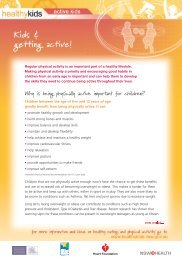I Move We Move - Good For Kids - NSW Government
I Move We Move - Good For Kids - NSW Government
I Move We Move - Good For Kids - NSW Government
Create successful ePaper yourself
Turn your PDF publications into a flip-book with our unique Google optimized e-Paper software.
7.3<br />
Small screen learning experiences<br />
Computers, television and game consoles are a part of our lives. While no one is undermining the<br />
value of this these technologies; learning how to use the small screen responsibly, so that it is of<br />
benefit rather than harm is important. Services can conduct small screen learning experiences to<br />
help children learn how to use the small screen responsibly. Preschoolers are most developmentally<br />
ready for these learning experiences.<br />
Conducting small screen learning experiences helps children understand why it is important to<br />
turn off the television or computer and get active and can also assist to develop their ability to be a<br />
critical rather than a passive consumer of media.<br />
Many of the ideas for small screen learning experiences are adapted from the Munch and <strong>Move</strong><br />
Resource Manual developed by <strong>NSW</strong> Health. <strong>NSW</strong> Health has kindly granted permission to adapt<br />
parts of this resource.<br />
The learning experiences follow a three step process:<br />
1. Introduce the concepts through an activity, for example:<br />
• Develop social stories and read books that reinforce the concept of ‘turn off the television or<br />
computer and get active’ 4<br />
• Arrange for guest speakers that are physically active, for example from sports clubs or dance<br />
studios to visit the service to demonstrate and get the children involved in physical activity4 • Role play scenarios that involve small screen recreation (see pages 7.5–6 for examples)<br />
2. Explore these concepts through discussion – ask questions and explain key points (using<br />
child friendly terms) for example:<br />
• What are your favourite TV shows, computer games or DVDs?4<br />
• Discuss their favourite characters and how they have lots of energy and look healthy, so they<br />
must do healthy things every day like move and play rather than sit still, eat healthy foods,<br />
drink plenty of water, get enough sleep etc 28<br />
• When do you watch TV, watch DVDs/play computer games? (Discuss in terms that the children<br />
will understand, for example both before and after preschool, during dinner, and at breakfast<br />
time etc) 4<br />
• How much TV do you watch/DVDs do you watch/computer games do you play? (Discuss in<br />
terms that the children understand, for example both before and after preschool, during<br />
dinner, and at breakfast time etc.) 4<br />
• Explain that activities such as watching TV and playing on the computer are called ‘screen time’ 4<br />
• Discuss with children that we should only participate in no longer than one hour of screen time<br />
per day. To help explain screen time use images of a computer, electronic games console and<br />
television and describe the one hour time limit in a way that children understand e.g. as long<br />
as it takes to watch (insert name of a 1 hour long children’s DVD or TV program that is<br />
popular amongst the children at your service) 4<br />
• Explain that being active is important for all children as they grow and develop. Young children<br />
need plenty of opportunities to move throughout the day and should not sit still for a long time4 • Explain to children that after screen time there needs to be active time. Explore with children<br />
the types of activities the children can participate in instead of or after screen time 4<br />
I <strong>Move</strong> <strong>We</strong> <strong>Move</strong>, The Guide Edition 1 August 2009<br />
AREA HEALTH SERVICE




